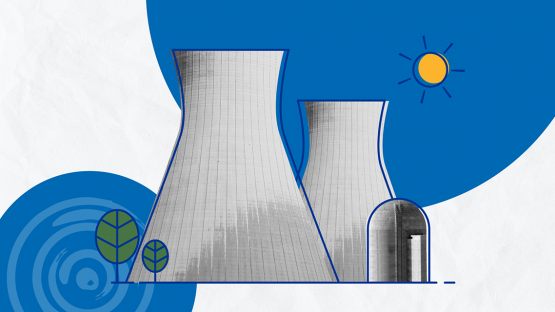Countries from Armenia and Ghana to Poland and Türkiye show significant potential for using nuclear energy to slash greenhouse gas (GHG) emissions and meet climate change goals including those agreed at the COP26 climate summit, according to national research conducted in a three-year project coordinated by the IAEA.
The findings of the Coordinated Research Project (CRP) illustrate the potential scope for increasing the use of nuclear power to support stronger national climate change mitigation goals as requested in the “Glasgow Climate Pact” agreed at COP26 last month. Around 30 countries include nuclear energy in plans submitted under the 2015 Paris Agreement — including both near-term (2030) targets in so-called Nationally Determined Contributions (NDCs) and longer term strategies for net zero emissions — and the CRP results reflect growing interest in nuclear among additional countries seeking to adopt more ambitious climate goals.
“Overall, the country teams’ research demonstrates that nuclear energy has significant potential to contribute to climate change mitigation, depending on national circumstances,” said Hal Turton, an IAEA energy economist and scientific officer for the CRP. “The research teams also noted that nuclear energy is well suited to powering economic growth, maintaining energy supply security by reducing import dependence, ensuring a reliable and flexible electricity system, and supporting broader sustainable development objectives.”
The CRP, entitled “The Assessments of the Potential Role of Nuclear Energy in National Climate Change Mitigation Strategies”, brought together research teams from 12 countries facing a range of energy, development and climate challenges with the goal of examining how nuclear power, together with other sources of low-carbon energy, could help. These teams developed and applied various analytical frameworks and modelling tools to project energy demand over the next few decades, assess technology options and supply portfolios to satisfy the projected demand, and evaluate the implications of those portfolios for GHG emissions.
The research teams in Armenia, Pakistan, Poland and Türkiye identified significant potential for nuclear power in climate change mitigation in their countries. If upfront investment costs and financing barriers can be addressed, nuclear power was also seen as increasingly attractive for mitigation in Chile, Ghana and South Africa. For three other countries— Croatia, Lithuania and Viet Nam — nuclear power was seen as currently uncompetitive. Australia and Ukraine shared their expertise under different reporting arrangements; the research team in Ukraine identified a significant potential for nuclear power.
Ghana and Poland are among around 30 so-called nuclear newcomer countries that are embarking on or considering the introduction of nuclear power. Armenia and South Africa already operate nuclear power plants and are considering expanding its use, while Pakistan is constructing new capacity to add to its existing reactor fleet. Türkiye is building its first reactors, while for Chile nuclear power could warrant consideration in the future.
At an IAEA event at COP26 last month, Ghanaian Energy Minister Matthew Opoku Prempeh said the country was considering nuclear energy for low carbon baseload electricity, which hydropower resources could no longer sustain. “The CRP outcome assisted the Ghana Nuclear Power Programme to further justify the inclusion of nuclear power into the energy mix,” said Seth Kofi Debrah, Director of the Nuclear Power Institute of the Ghana Atomic Energy Commission. “In addition, the CRP outcome contributed to the general considerations by Ghana in including nuclear power into its NDCs submission,” he said, adding that Ghana revised its NDC in November 2021 to include nuclear power.
For Armenia, which already relies on a single nuclear power reactor for about one third of its electricity production, the assessment of several energy scenarios indicated that utilizing nuclear power could enable the country to comply fully with its commitments under the Paris Agreement. Like Ghana, Armenia also updated its NDC to include nuclear power for the first time in 2021.
For Poland, the research affirmed the significance of nuclear energy for future climate change mitigation, in line with national plans to build six large nuclear power reactors over the next two decades to support both climate and energy security goals. As Poland currently relies on coal to generate about 70% of its electricity, profound changes in the country’s economy and society are likely to be needed to meet its Paris Agreement commitments, and the CRP research showed that adding nuclear to the mix can deliver higher employment and GDP to ensure this transition to clean energy supports social and development goals.
Aside from supporting national efforts to evaluate the potential role of nuclear energy, the CRP enhanced the knowledge and experience of experts from participating countries in evaluating energy and climate change strategies and policies more broadly. By “exchanging experience with experts from other countries … [the CRP has helped to raise] the level of knowledge … and also facilitate defining the most important determinants of national strategic documents and plans in the energy sector,” said Professor Mladen Zeljko, Chief Operating Officer of the Energy institute Hrvoje Pozar in Croatia.
Many of the national research teams, including Croatia’s, made use of IAEA energy modelling tools to evaluate the potential of nuclear energy in the CRP. The study by Croatia, which jointly operates a nuclear power plant with neighbouring Slovenia, showed that while building a new large nuclear power plant is not competitive at current financing rates and carbon prices, the country intends to monitor developments in SMRs as a potential affordable and flexible low-carbon energy option.
“The CRP was of great benefit to us in developing national strategic plans related to climate and energy and helped us to consistently create scenarios and set key goals for the long-term development of the energy sector and its impact on climate change,” Zeljko said.





